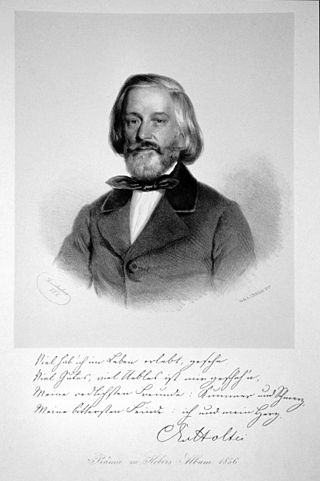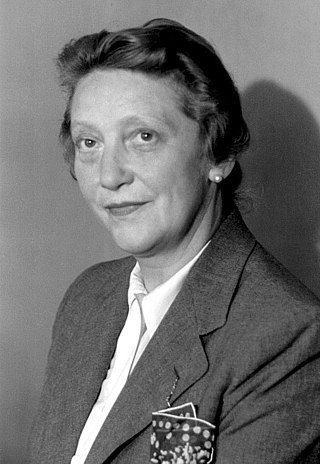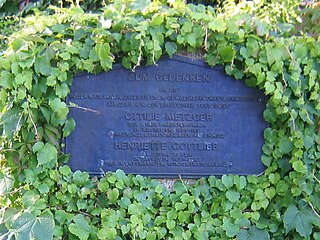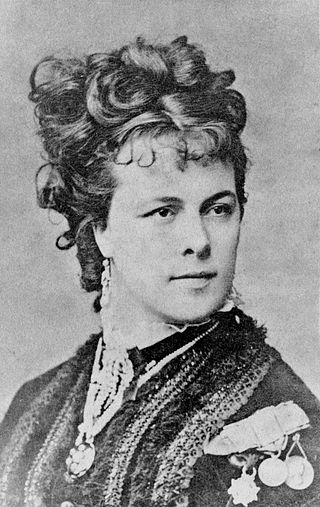
Ida Pellet (1838 - 10 July 1863) was a German classical actress, originally from the Austrian Empire, who died young. [1] [2]

Ida Pellet (1838 - 10 July 1863) was a German classical actress, originally from the Austrian Empire, who died young. [1] [2]
Ida Pellet was probably born in Graz. [1] [2] Reference is also made to sources giving her place of birth as Lemberg or Linz, and it was to Linz where her father, Joseph Pellet, having retired from a successful career as a theatre director in a succession of cities, had retired in order to focus on preparing his daughter for her own stage career. [1] Thanks to her father she was able to make her theatre debut at Nuremberg in 1853, while still a child. She appeared at Linz in 1954, [2] and there were also early appearances at the Carltheater in Vienna. [1]
She spent the next four years at the Stettin Theatre where she worked under the artistic direction of Edgar Hein, especially in respect of conversation pieces, and quickly became a favourite with audiences. In the first part of 1858 she signed up with the Court Theatre in Wiesbaden where for the next three years she concentrated on tragic roles. In November 1859, Lina Fuhr retired from the Berlin Hofbühne Theatre and married an Eye Doctor. In Summer 1860, Ida Pellet made her first appearance at the Hofbühne, at this stage as a guest performer and a competitor for the vacancy left by Miss Fuhr who had been the theatre company's leading tragic heroine. Pellet's successes in "The Maid of Orleans" and other popular classics of the time secured for her a place in the company with effect from September 1861. [2] Other noteworthy performances were as Maria Stuart, Leonore, Gretchen, Jane Eyre, Lorle and Anne Liese, along with Chriemhilde in Hebbel's Nibelungen and Marfa in Heigel's eponymous drama-tragedy. [1]
In Summer 1826 Pellet travelled to Prague for a series of guest performances. In the middle to June she moved on to Leipzig where on 20 June she opened in "The Widow of Lowood" (a drama based on Jane Eyre). She appeared in the same piece each night till 26 June. On 28 June she was due to open in "The Maid of Orleans" and took part in the morning rehearsal. Her appearance that evening was cancelled on account of her sickness, however, and she would never return from her sickbed. Twelve days later, despite attentive nursing in the Hotel Bavière, she died. [1]
Karl von Holtei wrote: [3]
Beyond any doubt, Ida Pellet became one of the most professional and talent-filled actresses of modern times. Beauty, grace, affecting gestures, insightful presentation and a magical understanding of language, a vocal resonance that penetrated deep into the heart. Anyone who has seen her in Act 5 of Maria Stuart will agree. She had not yet reached the artistic heights for which she seemed destined. But already she was far along that way in a shining career. Then death quietly destroyed the beautiful youthful being in full bloom.
Ida Pellet ist unzweifelhaft eine der berufensten, talentvollsten Darstellerinnen neuerer Zeit gewesen. Schönheit, Anmut, liebliche Gebärde, Auffassungsgabe und ein Zauber der Sprache, ein Klang der Stimme, der tief zum Herzen drang. Wer sie im 5. Akt der „Maria Stuart“ gesehen, wird beistimmen. Sie war noch nicht auf der höchsten, ihr erreichbaren Stufe der Künstlerschaft. Doch ragte sie schon weit hervor mit feurigem Streben. Da brach der Tod in seiner schleußlichen Gestalt das Schöne, jugendliche Dasein mitten in vollster Blüte.

Karl Eduard von Holtei was a German poet and actor.

Charlotte Wolter, Austrian actress, was born at Cologne, and began her artistic career at Budapest in 1857.
Marieluise Fleißer was a German writer and playwright, most commonly associated with the aesthetic movement and style of Neue Sachlichkeit, or New Objectivity.

Christine Buchegger was an Austrian theater and television actress, born in Vienna, Austria.

Katharina "Käthe" Dorsch was a German stage and film actor.

Elfriede Gerstl was an Austrian author and Holocaust-survivor. Gerstl, who was Jewish, was born in Vienna, where her father worked as a dentist.

Gustav Emil Devrient was a German actor and an occasional operatic bass.

Henriette Gottlieb was a German soprano.

Maria Janitscheknée Tölk was a German writer of Austrian origin. She wrote under the pseudonym of Marius Stein.

Sonja Kehler was a German actress and chanson singer, known internationally for her interpretation of works by Bertolt Brecht, first playing his characters on the theatre stage, then focused on singing his songs and those of others in solo programs. She also taught acting in Danish at the theatre academy in Odense, appeared in films, worked as stage director and presented literary programs.

"Christ fuhr gen Himmel" is a German Ascension hymn. The church song is based the medieval melody of the Easter hymn "Christ ist erstanden". It was an ecumenical song from the beginning, with the first stanza published in 1480, then included in a Lutheran hymnal in 1545, and expanded by the Catholic Johannes Leisentritt in 1567. It appears in modern German Catholic and Protestant hymnals, and has inspired musical settings by composers from the 16th to the 21st century.
Anna Feodorowna Krüger was a German stage actress of great promise who died young.
Gertrud Fussenegger was an Austrian writer and a prolific author, especially of historical novels. Many commentators felt that her reputation never entirely escaped from the shadow cast by her enthusiasm, as a young woman, for National Socialism.

Klara Ziegler, also Clara Ziegler, was a German stage actress and writer.

"Kommt ein Vogel geflogen" is a German-language Volkslied and love song from Lower Austria. While it was passed down orally, probably in dialect, some text first appeared in print in 1807. Six stanzas appeared in a Posse mit Gesang by Karl von Holtei in Berlin in 1824 and made the song popular. In arrangements, it also became a children's song. Siegfried Ochs treated the melody humorously to variations for piano, imitating different styles of classical composers.

Clara Stich, usually Hoppé, married name Liedtcke, was a German actress and singer.

Auguste Sophie Crelinger (widowed Stich, born Düring was a German stage actress.
Friedrich Adolf Alexander Groschke was a German civil servant and parliamentarian.
Gisela Tschofenig was an (illegal) Austrian Communist political activist who after 1938 became an anti-government resistance activist. In 1945 fellow detainees at the Schörgenhublabour camp, who had heard overnight shots on 27/28 April, after seeing Tschofenig called outside with two other women, had their fears confirmed the following morning when one of the camp guards was seen to be wearing their friend's "mountain boots".

Katharina "Katja" Paryla was a German actress, stage director and theatre director. She was known especially for her work on stage, including at the Deutsches Theater Berlin where she often played leading roles with her partner Alexander Lang directing, including the title roles of Goethe's Iphigenie auf Tauris and Medea by Euripides, and Alice in Strindberg's Totentanz.